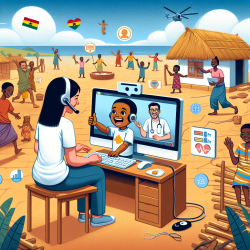Introduction
In the realm of speech-language pathology, data-driven decisions are crucial for creating impactful outcomes, especially for children. Drawing parallels from the research article "Volunteer responsibilities, motivations and challenges in implementation of the community-based health planning and services (CHPS) initiative in Ghana," we can glean valuable insights that can enhance online therapy services provided by companies like TinyEYE.
Understanding the CHPS Initiative
The Community-Based Health Planning and Services (CHPS) initiative in Ghana emphasizes community volunteerism as a cornerstone for delivering primary healthcare. Volunteers play vital roles in resource mobilization, logistics management, and conflict resolution, which are essential for the program's success. The motivations for volunteering include value, understanding, and protective functions, while challenges such as financial constraints and lack of recognition persist.
Applying Insights to Online Therapy
Online therapy services can benefit from the CHPS model by incorporating similar strategies to engage stakeholders and enhance service delivery. Here are a few key takeaways:
- Resource Mobilization: Just as CHPS volunteers gather resources, online therapy providers can leverage community support and partnerships to enhance their offerings.
- Volunteer Motivation: Understanding the motivations of volunteers can help in designing programs that align with their values, ensuring sustained engagement and commitment.
- Addressing Challenges: Identifying and addressing logistical and financial challenges can improve the effectiveness and reach of online therapy services.
Encouraging Further Research
For practitioners in the field of speech-language pathology, further research into community-based health models like CHPS can provide deeper insights into volunteer management and program implementation. By understanding the motivations and challenges faced by volunteers, practitioners can develop strategies that are both effective and sustainable.
Conclusion
By integrating the lessons learned from Ghana's CHPS initiative, online therapy services can be enhanced to better serve children. Emphasizing community involvement, understanding volunteer motivations, and addressing logistical challenges are key strategies that can lead to improved outcomes.
To read the original research paper, please follow this link: Volunteer responsibilities, motivations and challenges in implementation of the community-based health planning and services (CHPS) initiative in Ghana: qualitative evidence from two systems learning districts of the CHPS+ project.










